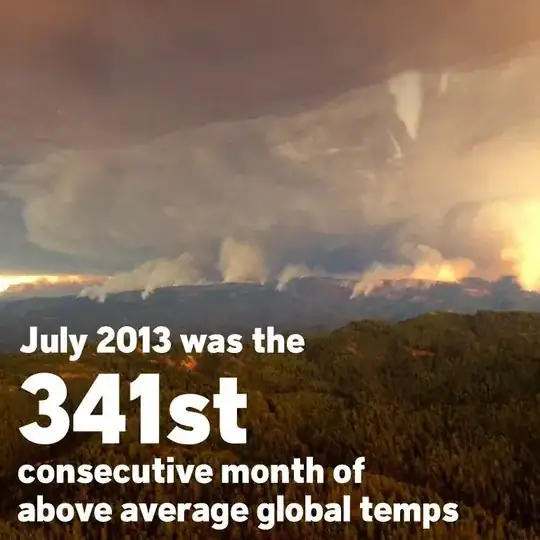What's being compared
The NOAA Global Analysis — July 2013 says:
This marks the 341st consecutive month, since February 1985, that the global monthly temperature has been higher than the long-term average for its respective month.
The "global monthly temperature" means the "combined average temperature over global land and ocean surfaces". (NOAA Global Analysis)
This page explains how the combined average temperature over global land and ocean surfaces is calculated:
The global time series is produced from the Smith and Reynolds blended land and ocean data set (Smith et al., 2008). This data set consists of monthly average temperature anomalies on a 5° x 5° grid across land and ocean surfaces. These grid boxes are then averaged to provide an average global temperature anomaly. An area-weighted scheme is used to reflect the reality that the boxes are smaller near the poles and larger near the equator. Global-average anomalies are calculated on a monthly and annual time scale. Average temperature anomalies are also available for land and ocean surfaces separately, and the Northern and Southern Hemispheres separately. The global and hemispheric anomalies are provided with respect to the period 1901-2000, the 20th century average.
I see no reason to doubt the NOAA conclusion that the global monthly temperature for the previous 341 months each was higher than the month's long-term average temperature. This is consistent with the hypothesis that the Earth is warming or has warmed.
The data
The combined mean surface temperature (°C) based on the years 1901-2000:
Jan: 12.0
Feb: 12.1
Mar: 12.7
Apr: 13.7
May: 14.8
Jun: 15.5
Jul: 15.8
Aug: 15.6
Sep: 15.0
Oct: 14.0
Nov: 12.9
Dec: 12.2
Here is the combined average temperature over global land and ocean surfaces from 1880-present, reported as units of 0.01°C change from the average global mean from 1950-1980 (14.0°C): http://data.giss.nasa.gov/gistemp/tabledata_v3/GLB.Ts+dSST.txt
In that dataset, February 1994 was the most recent month where the average global temperature was lower than the global mean from 1950-1980.
It appears that the "long-term average for its respective month" quoted in the study is not simply the period between 1950-1980, because the claim is false if that is the case.
However, if you include a longer period of history before 1950, that pulls the "long-term average for its respective month" downward. Whether or not the question's claim is true turns on the definition of "long-term average for its respective month".
Pedantry
If you're 28 or younger, you haven't experienced a full month of average global temperatures ever in your lifetime.
Nobody has "experienced a full month of average global temperatures", ever. An global average is just an average, and it's totally consistent that the Earth itself has not experienced a full month of average global temperatures, and even more certain that no one person has experienced a full year of temperature that happens to match the global average.
